Manfacturing
What do these photos tell you about where goods were manufactured in cities?
Van Briggle's Pottery Factory
This photo was taken at the Van Briggle Pottery factory in Colorado Springs. The man in the suit is Artus Van Briggle, the factory owner.
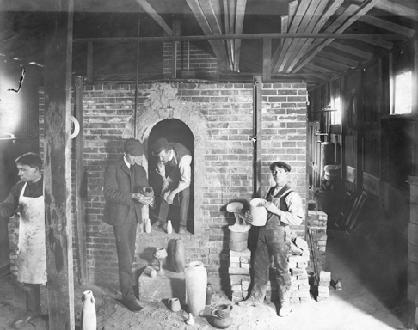
Photo: Denver Public Library, Western History Collection
More About This Topic
The cities of Colorado were centers of manufacturing. Skilled craftsmen set up shops to make and sell their products. They came from the Eastern United States and as far away as Europe to build shops and factories in Colorado. Artus Van Briggle was a pottery maker from Ohio who had studied art in Paris.
Grand Junction Blacksmith Shop
This is a blacksmith shop in Grand Junction. The men are standing beside a forge used to heat metal.
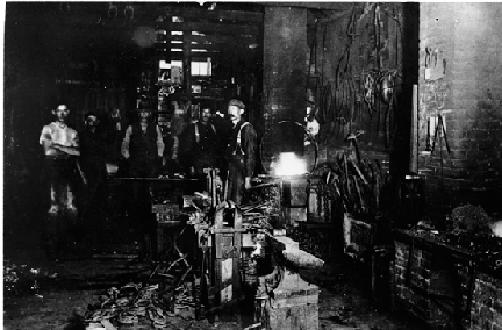
Photo: Colorado Historical Society
More About This Topic
Almost every town had a blacksmith shop. They produced and repaired a variety of items made of iron. Farmers, miners, and townspeople went to blacksmith shops to have tools made and broken ones mended. Blacksmiths made horseshoes, iron gates and hinges, and many other items.
Their Own Words
“When I’d get to go to town about twice a year with a [mule] skinner [a driver], . . . there was probably at least one, maybe two blacksmith shops, and that was my pet place to hang around. . . . I think I was about twelve year old before I ever shod my first horse.”
Source: Ernie Ross quoted in Maria M. Rogers, ed., In Other Words: Oral Histories of the Colorado Frontier (Golden, CO: Fulcrum Publishing, 1996): 55.
A Saddle And Harness Shop
This photo was taken in Grand Junction in a saddle and harness maker's shop.
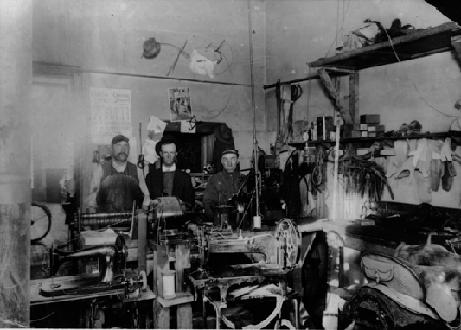
Photo: Colorado Historical Society
More About This Topic
Many towns and cities also had a harness shop. These shops produced the leather harnesses used to hitch horses to buggies and wagons. Most harness shops also made saddles. Can you find the saddle in this photo?
The Milwaukee Brewing Company
The building in this photo is a Denver brewery. The brewery produced beer.
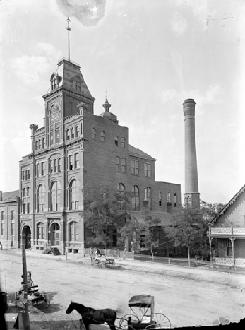
Photo: Denver Public Library, Western History Collection
More About This Topic
Beer was a popular adult beverage in Colorado. Many Colorado cities had their own breweries. The Tivoli-Union Brewery shown in this photograph produced beer in Denver for over a hundred years. This building has been preserved. It is now part of the Auraria college campus in downtown Denver.
A Cement Plant
This is a cement factory located near Pueblo. Construction in and around cities created great demand for cement.
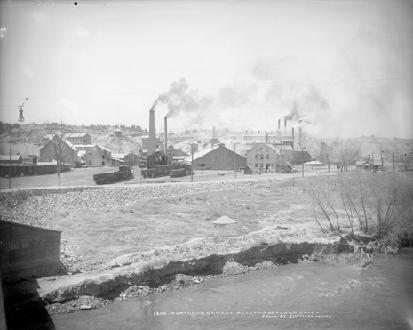
Photo: Denver Public Library, Western History Collection
More About This Topic
Large cities also had big factories and industrial plants nearby. Pueblo was famous for its steel mills, Denver for its smelters, and other cities for sugar factories and packing companies. While these businesses created wealth for the owners and jobs for their workers, they also created smoke and other pollution.
Their Own Words
“It was not all play, however, in those days of a city’s happy youth. On every side were evidences of capital and labor at work. Black plumes of smoke waved above the tall chimneys of vast sprawling smelters, and when the breeze came from the northwest our nostrils stung with the sharp pungency of chemical fumes. Long trains of box cars, loaded high with ore, rumbled down the mountain canons to feed the . . . furnaces. . . .”
Source: Joseph E. Smith, “Personal Recollections of Early Denver,” Colorado Magazine, 20 (March 1943): 71.
A Canning Factory
This photo shows the inside of a canning factory. The factory canned vegetables grown on Colorado farms. Both men and women worked in this canning factory.
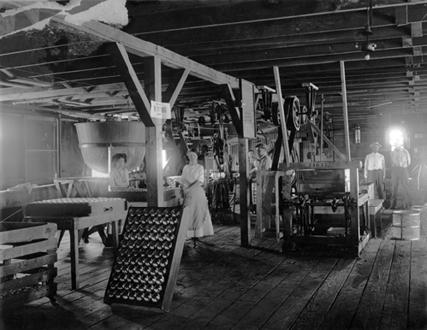
Photo: Colorado Historical Society
More About This Topic
City factories were and are closely tied to the resources surrounding them. Canning factories became important in many Colorado cities because of the produce of farms close by. This factory canned many types of vegetables grown on Colorado farms--beans, peas, and corn for example.

